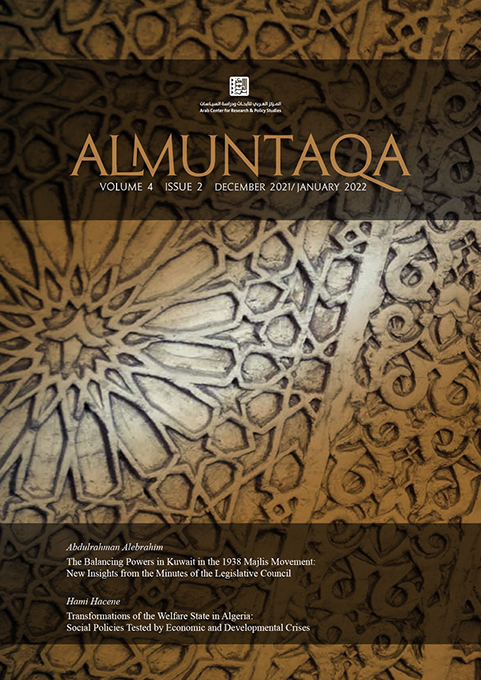 The ACRPS and the Doha Institute for Graduate Studies have published Issue 9 (December 2021/ January 2022) of AlMuntaqa journal, published in English, and includes a selection of various articles and reviews previously published in Arabic by ACRPS and carefully chosen for translation and publication.
The ACRPS and the Doha Institute for Graduate Studies have published Issue 9 (December 2021/ January 2022) of AlMuntaqa journal, published in English, and includes a selection of various articles and reviews previously published in Arabic by ACRPS and carefully chosen for translation and publication.
The opening article by Abdulrahman Alebrahim titled "The Balancing Powers on Kuwait in the 1948 Majlis Movement: New Insights from the Minutes of the Legislative Council” re-examines the events of the 1938 Majlis movement in Kuwait, which was examined in the literature with descriptive rather than analytical tools and largely limited to the economic dimensions of the struggle between sheikhs and merchants. The existing literature neglects the contribution of what this paper refers to as the "balancing powers" in the establishment of the councils in 1938 and 1939. This paper sheds light on the role of the other social forces in the establishment and dissolution of Kuwait's 1938 and 1939 Legislative Councils.
In "Transformations of the Welfare State in Algeria: Social Policies Tested by Economic Developmental Crises", Hami Hacene explores the relationship between transformations of the welfare state in Algeria and social constraints in the context of economic crisis. The paper investigates the historical and ideological contexts that led to the emergence of the welfare state and state capitalism as well as shifts in social policy in light of economic crises and the floundering of the development project. This reading enables a better understanding of the current status of the welfare state and its implications in a context of widespread protest, driven by social resentments that have festered in recent years.
Hani Awad’s contribution, "Understanding Hamas: Remarks on Three Different and Interrelated Theoretical Approaches", distinguishes between three interwoven theoretical approaches prevalent in writings of researchers seeking to understand the emergence of the Islamic Resistance Movement, "Hamas". The first of these approaches examines the movement from the portal of ideology, stressing the importance of international and regional dimensions and the rise of political Islam after the 1967 War. The second approaches Hamas as a social movement organization seeking to revisit the historical narrative of Palestinian society. The third considers Hamas to be the heir of the Palestinian national liberation movement. Although the three readings do not contradict each other, a focus on one of them can lead to oversimplification or exaggeration.
Rahal Boubrik’s "Nineteenth Century Slave Markets: The Moroccan Slave Trade" examines the trade of black slaves brought from western Sudan to Morocco during the nineteenth century. The paper presents the problems prevalent in using a quantitative approach to the slave trade and the systematic questions it poses. It also documents sales techniques and the internal structure of slave markets in Moroccan cities as an institution, reflecting the reality and position of slaves in Moroccan culture. The focus here is on the slave trade, as opposed to slavery, as two separate phenomena.
The articles are concluded with a study by Nezar Alsayyad titled "Bottom-up Urbanization and the Culture of Squatting: A Critical Assessment". It studies informal housing, or what some call "bottom-up urbanization”, which constitutes a major part of the housing in developing Third World countries. Many researchers attribute the emergence and development of such informal housing to the informal and uncontrolled economy in countries of the Global South. Several theories emerged in the mid-twentieth century to explain this phenomenon, which has led to proposals and policies that encouraged the urban poor to build their own homes. On this, the paper presents a critique of some of these proposals and policies, and offers a new theoretical contribution to the understanding of bottom-up urbanization with an emphasis on the centrality of the cultural factor.
The issue also contains an analysis by the Public Opinion Polling Unit at the ACRPS titled "Public Opinion Trends on the Democratic Experiment in Tunisia", which presents trends in Arab public opinion toward the Tunisian democratic experiment through data from the Arab Opinion Index and comparing the 2019-2020 poll to previous surveys. It also measures the popular reaction to decisions taken by Tunisian president Kais Saied during his coup to suspend the constitution and the mechanisms of democratic rule in the interest of seizing power. It seeks to uncover why Tunisians welcomed the president's decisions and whether that means that they have turned their backs to the democratic experiment they inaugurated ten years ago. Finally, the paper monitors a set of Arab public opinion indicators on institutions of governance and the government's determination to resolve socioeconomic problems, which have intensified during the spread of the novel coronavirus (COVID-19).
Lastly, the book reviews section includes two book reviews: Sena Khateeb’s review of A Study in the Foreign Policy of Qatar by Zuhair al-Mokh, and Majd Abuamer's review of Palestinians Worldwide: A Demographic Study by Youssef Courbage and Hala Nofal.
AlMuntaqa seeks to continue advancing the goal of cross-regional knowledge accumulation between Arab and English-speaking scholarship.